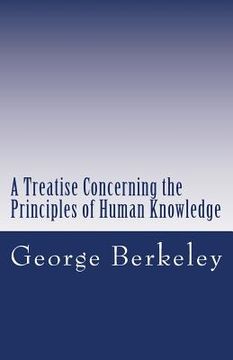Compartir
A Treatise Concerning the Principles of Human Knowledge (en Inglés)
George Berkeley
(Autor)
·
Createspace Independent Publishing Platform
· Tapa Blanda
A Treatise Concerning the Principles of Human Knowledge (en Inglés) - Berkeley, George
$ 28.487
$ 47.478
Ahorras: $ 18.991
Elige la lista en la que quieres agregar tu producto o crea una nueva lista
✓ Producto agregado correctamente a la lista de deseos.
Ir a Mis Listas
Origen: Estados Unidos
(Costos de importación incluídos en el precio)
Se enviará desde nuestra bodega entre el
Lunes 19 de Agosto y el
Lunes 02 de Septiembre.
Lo recibirás en cualquier lugar de Argentina entre 1 y 3 días hábiles luego del envío.
Reseña del libro "A Treatise Concerning the Principles of Human Knowledge (en Inglés)"
A Treatise Concerning the Principles of Human Knowledge is a 1710 work by the Irish Empiricist philosopher George Berkeley. This book largely seeks to refute the claims made by his contemporary John Locke about the nature of human perception. While both Locke and Berkeley, like all the Empiricist philosophers, agreed that there was an outside world and that it was this world which caused the ideas one has within one's mind; Berkeley sought to prove that outside world was also composed solely of ideas. Berkeley did this by suggesting that "Ideas can only resemble Ideas" - the mental ideas that we possessed could only resemble other ideas (not physical objects) and thus the external world consisted not of physical form, but rather ideas. This world was given logic and regularity by some other force, which Berkeley did his best to conclude was a God. Long refuted by most philosophers, Berkeley's claims are often felt to have been a form of rationalization - Berkeley later became Bishop of Cloyne, and was a highly religious man. Treatise's suggestion that the world was made of ideas with an omnipitent force guiding was his alternative to the Lockean Empiricism popular at the time, which Berkeley felt led to skepticism. In spite of this Berkeley was a capable, respected and entertaining thinker. Some doubt exists as to whether he truly believed his conclusion that the world at large was composed of ideas; with modern thinking tending towards him indeed having thought this to be the case. Whether viewed as extreme skepticism or enlightened common sense, the writings of Berkeley are a major influence on modern philosophy. Bishop Berkeley (1685-1753) was one of the great British empirical philosophers. He believed that the existence of material objects depends on their being perceived and The Principles of Human Knowledge sets out this denial of non-mental material reality. At first his views were unfavorably received by the London intelligentsia, and the entertaining Three Dialogues between Hylas and Philonous are a clarification of the Realist argument and a response to accusations of atheism and skepticism. In the nineteenth century John Stuart Mill wrote that he considered Berkeley's work to be of "greatest philosophic genius," and it is true to say that its Immaterialism has influenced many recent philosophers.
- 0% (0)
- 0% (0)
- 0% (0)
- 0% (0)
- 0% (0)
Todos los libros de nuestro catálogo son Originales.
El libro está escrito en Inglés.
La encuadernación de esta edición es Tapa Blanda.
✓ Producto agregado correctamente al carro, Ir a Pagar.

